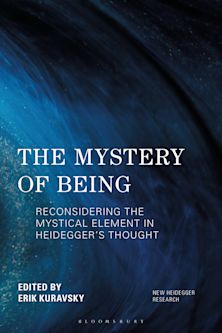- Home
- ACADEMIC
- Philosophy
- Philosophy - Other
- Shaping the Future
Shaping the Future
Nietzsche's New Regime of the Soul and Its Ascetic Practices
Shaping the Future
Nietzsche's New Regime of the Soul and Its Ascetic Practices
You must sign in to add this item to your wishlist. Please sign in or create an account
Description
Shaping the Future maps out the ascetic practices of a Neitzschean way of life. Hutter structures his argument around the belief that Nietzsche, despite his ostensive enmity to Platonism and Socratism, understood himself to be a Socratic and someone called upon by fate to renew the Platonic task of being a philosophical legislator of modern souls, culture, and political society. Hutter also considers the paths of reasoning opened up by Pierre Hadot in his studies of ancient philosophers as teachers of life and not just as providers of "true" opinions and doctrines about the world.Shaping the Future applies the reasonings of Hadot to the work of Nietzsche, arguing that Nietzsche himself, throughout his philosophical career, conceived of doctrines as never identical to philosophy itself, but instead as a means of self-creation that had to be related to working on oneself. Hutter makes a great contribution to the study of Nietzsche and the growing movement that sees philosophy as a practical activity and way of life.
Table of Contents
Chapter 2 Preface
Chapter 3 Introduction: A Summary of Arguments
Chapter 4 Philosophy as Therapy and the Therapy of Philosophy
Chapter 5 Einsamkeitmehre - The Practices of Solitude
Chapter 6 The Dialectics of Solitude and Friendship
Chapter 7 Writing the Future, Reading the Self
Chapter 8 Nutrition and the Casuistry of Selfishness
Chapter 9 Dance and the Return of Dionysus
Chapter 10 Epilogues: Actio in Distans
Chapter 11 Selected Bibliography
Chapter 12 Index
Chapter 13 About the Author
Product details
| Published | Dec 30 2005 |
|---|---|
| Format | Ebook (PDF) |
| Edition | 1st |
| Extent | 242 |
| ISBN | 9798216273349 |
| Imprint | Lexington Books |
| Series | Critical Perspectives on Crime and Inequality |
| Publisher | Bloomsbury Publishing |
About the contributors
Reviews
-
Hutter argues that the root and branch of Nietzsche's philosophy is classical Greek, that Nietzsche's perspective is accompanied by 'ascetic practices', thus ways of not only viewing life but also ways of living life. Hutter may have shown us the way Nietzsche would have wanted us to view his work. In my opinion, this is a profound and important work.
Tom Darby, Carleton University
-
Horst Hutter is unique among political theorists today in combining a deep knowledge of modern thought with a sympathetic understanding of the philosophical schools of late antiquity. In this challenging book he applies to Nietzsche Pierre Hadot's notion of philosophy as askesis or a discipline of reshaping oneself in all respects of both body and soul. The result is a Nietzsche rescued from postmodernism and closer than supposed to classical philosophy. Sometimes critical but always sympathetic, insisting on the undiminished urgency of Nietzsche's critique of modern life, Hutter provides a model reading of an indispensable thinker.
Clifford Orwin, University of Toronto
-
A brilliant treatment of Nietzsche's thought as an exercise in philosophic therapy. Hutter brings the text alive in ways that are clear, consistently illuminating and often surprising. A valuable book both for the beginner and for the well-informed Nietzsche scholar.
Susan Shell, Boston College
-
Horst Hutter's Shaping the Future: Nietzsche's New Regime of the Soul and Its Ascetic Practices is the wise work of a serious disciple.
Nietzsche Circle
-
Can philosophy offer not just doctrines and academic theories, but "therapies" and concrete ways of re-orienting one's mode of living? Horst Hutter argues that this is precisely what was offered by ancient schools of philosophy, and that this original goal of philosophizing is renewed most authentically in modern philosophy by Friedrich Nietzsche. Hence, according to Hutter's provocative reading, Nietzsche, in his efforts to become "the philosophical therapist of his culture," expresses his profound fidelity to the original purposes of philosophy as conceived by the philosophers of antiquity.
Ronald Beiner, University of Toronto


































